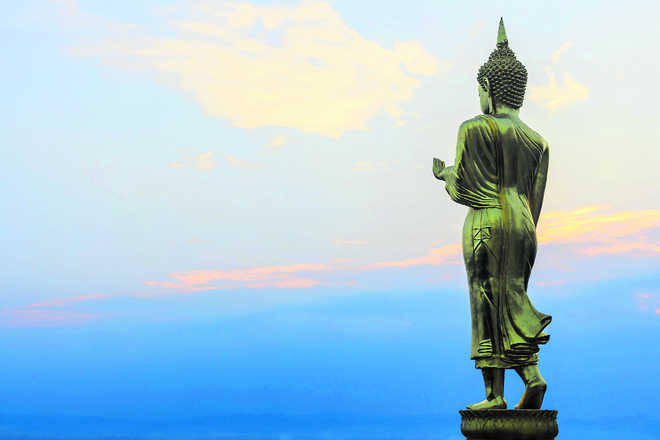Finding meaning in emptiness
Manmohan
The book is an attempt to synthesise an understanding on Buddhism gained by Stephen Batchelor, especially after the publication of his first book Alone with Others (1983). His earlier work Confession of a Buddhist Atheist (2010) is the reconstruction of stories of Buddha’s life entirely on the basis of Pali sources.
After Buddhism largely deals with a single question: What does it mean to practice the dharma of Buddha or Buddhism in the context of present times? On the title itself Stephen has flagged ‘Rethinking of dharma for the secular age’.
Stephen Batchelor, a well-known author, teacher and committed to the secularised version of Buddha’s teachings, feels time has come to articulate a coherent, ethical, contemplative and philosophical vision of Buddhism in the present times.
While making Agama literature and also records available in the Korean Zen traditions as a base for the book, After Buddhism has tried to pitch a philosophical, ethical, historical, and cultural framework of mindfulness and other such practices, which are rooted in the earliest canonical sources, but articulated afresh here. He says Buddhism is a historically contingent phenomenon that has continually adapted itself to different circumstances.
Stephen has been trained by Geluk School of Tibetan Buddhism, which teaches that the ultimate truth is emptiness. The realisation of emptiness begins with an enquiry into what it means to be a self. To understand the emptiness of a person, he feels, is to realise that this seemingly irreducible core has never been there. He describes this emptiness by the discourse between Buddha and his disciple Ananda:
‘Ananda: You were once living in Sakiya, Sir, among your kinsfolk in the town of Nagaraka. It was there that I heard you say from your own lips: “I mainly dwell by dwelling in the emptiness”. Did I hear that correctly?’
‘Buddha: Yes. Then, as now, do I mainly dwell by dwelling in emptiness.’
Stephen explains that emptiness is either the first and foremost condition in which we dwell, abide and live or an abode of a great person. Emptiness, thus, seems to be a perspective, a sensibility and a way of being in the poignant, contingent world.
The book proposes how in the course of history the concept of emptiness evolved from a way of dwelling on earth, unconditioned by reactivity into an ultimate truth, to be directly cognised in a non-conceptual state of meditation. Another question he addresses is ‘doubt’, which he says is directly correlated to the quality of one’s insight. For it, he uses the aphorism: ‘Great doubt — great awakening, little doubt — little awakening and no doubt — no awakening.’
In Zen, asking a question is the key question. To pose a question with sincerity, one needs to suspend all expectations as to what the answer might be. One needs to rest in the condition of unknowing, vitally alert to the sheer mystery of being alive rather than dead. Thus Stephen elaborates that one cultivates a middle path between ‘it is’ and ‘it is not’, affirmation and negation, being and nothingness. The point here is — not to reject dualities in favour of hypothetical ‘non dualities’, but to learn to live with them more lightly, fluidly and ironically.
While describing the next key, duality, Stephen elaborates the words ‘religious’ and ‘secular’. While applying this duality to Buddhism, he does not see secular Buddhism as the end result of the secularisation of Buddhism. This renders Buddhist ideas and practices palatable and useful for those who have no interest in committing themselves to the core values of dharma.
The kind of Buddhism, he envisages would consider those core values to be a necessary framework for humans to flourish and to realise ultimate concerns. Therefore, his concern is as much about imagining a Buddhist secularity as about imagining a secular Buddhism.
By writing After Buddhism, Stephen Batchelor transcends Buddhist dogma to highlight the vision of dharma that goes right into the heart of the contemporary global world culture. He emerges as the finest and wisest guide in the world today to the complicated path that is combining Buddhism with humanism. A must read for all the students of Buddhism!










